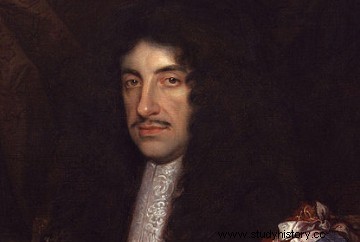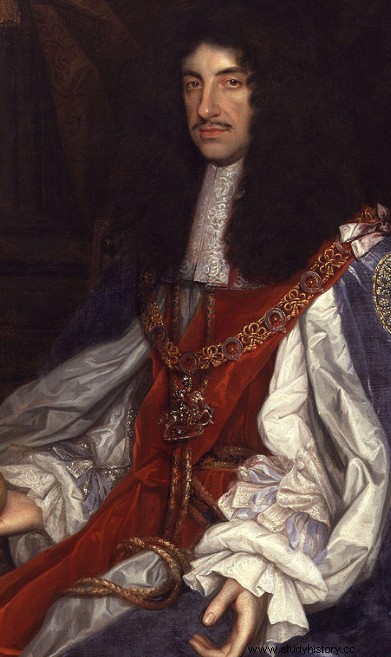After the War of the Three Kingdoms or the War of the Three Kingdoms, the royal government was revived in England.
The resurrected was Charles, the son of Charles I and Louis XIII's sister Henrietta Maria, who would call himself Charles II when he was crowned.
Restoration of the Royal Government and Declaration of Breda

In 1660, the "Declaration of Breda" was issued as soon as Charles II, who had been in exile in France, took the throne.
The content is
- Forgiveness to those involved in the revolution
- Freedom of religion
- Approval of ownership of land moved by owners during the revolution
- Payment of unpaid money to the army
The provisional parliament of England was to take the trinity of the King, the House of Commons, and the House of Lords before the Puritan Revolution, and the era of the Restoration came in earnest.
Charles II traditionally performed a coronation at Westminster Abbey, recreating the crowns and other ornaments lost during the Puritan Revolution to make them gorgeous.
He then held a general election to rebuild the parliament, the Anglican Church was redeveloped, and the Catholics persecuted again, reduced their troops, and so on.
It was the Army that was reduced at this time, and instead of the weakening of the British Army, the Navy became stronger, leading to the great victory of Trafalgar later.
Charles II is set to receive an extraordinary £ 1.2 million support from Congress each year, instead banning traditional feudal and unapproved taxes, and Congress opens almost every year. I was struck.
Charles II left most of his politics to the ministers and parliamentarians, and he didn't say much about himself, so he emphasized the English tradition of reigning but not governing, and his relationship with Parliament was very high. It was good.
Marriage and territorial expansion
The king's marriage always influences the country. The Puritan Revolution during Charles I was not unrelated to the marriage of the daughter of a Catholic King of France.
Charles II married Catherine, the daughter of the King of Portugal.
Catherine then took ownership of Mumbai (Bombay) in India and Gibraltar in North Africa in lieu of her dowry, so these territories would subsequently become British territories. As you know, these two bases became the cornerstones of the development of the British Empire and became important bases connecting India and Britain.
However, the fact that Charles II and Catherine could not have children, and that Charles had children with his mistress and the number exceeded 10, had a great influence on the history of England later. Will be given.
Plague epidemic, Great Fire of London, Anglo-Dutch War
The history of Stewart England is a turbulent history. There were many problems under Charles II.
The plague became epidemic in 1665, and in 1666 the whole of London was surrounded by a sea of fire.
Furthermore, in 1667, the times became confused as the Netherlands bombarded the banks of the Thames.
Moreover, this era was the time when Louis XIV was inaugurated as King of France, and the British parliament formed an alliance with France with Sweden and the Netherlands, but from the perspective of Charles II, Louis XIV was his brother, and the king and parliament. The groove with and will deepen.
Religious issues
Since Martin Luther's religious reforms, religious issues have always been a major issue affecting the country.
Britain is a country controlled by the Protestant Anglican Church, headed by the King, who is the ruler of the country both administratively and spiritually.
In 1670, Charles II had a confidential meeting with his cousin Louis XIV. The content was the freedom of Catholic religion in England.
Charles II, who received the slush fund, issued a "Declaration of Indulgence" and literally apologized for the freedom of religion.
However, Congress opposes this. It enacted the "Test Act" that the law that does not pass through the parliament is invalid. This made it necessary to follow the rituals of the Anglican Church when taking important positions in England.
And here a big problem arose.
The king's younger brother, James, resigned from all positions.
He was a hero of the Anglo-Dutch War, a younger brother of the king, but at the same time a Catholic.
And here comes another annoying problem. There were no children between Charles II and his queen Catherine. So the right to succeed to the throne was in this James.
Catholics are at the top of the Church of England.
It should never have happened.
Exclusion Crisis and Tories and Whigs
Congress has confused the issue of succession to the throne. The issue of succession to the throne is confusing in Japan today, but there was a similar trend in England during this period.
The two-party system, which has continued for more than 300 years and has become a tradition not only in England but also in the United States, was born from this issue of succession to the throne.
" Tories " admits James' succession to the throne " Whigs " ".
Charles II was naturally associated with the Tories and succeeded to his next generation, with the names of their respective parties being accused of being "Scottish mobs (Whigs)" and "Irish thieves (Tory)," respectively. Became James.
No one might have predicted that this would later become a big swell and a major event involving England and the whole world.
The death of Charles II

In 1685 Charles II died.
He makes a serious confession, convinced of his own death.
"Actually, I was a Catholic."
Born as a Protestant, Charles II was ousted from the country when he was young and actually converted to Catholicism while living in his mother's home country of France.
Personal evaluation of Charles II
Unlike his father, I think he is a cautious and wise king.
Charles II did well without stimulating Congress so much, though not by far the best.
He didn't announce that he was Catholic until just before his death, probably because of his unique sense of balance.
Charles II is generally in line with the "Lazy king" era, and I think it's highly commendable that he pursued parliamentary politics without advocating absolute monarchy.
Reigns but does not rule
For a king of a country like England with many talented people, laziness may be just right.
